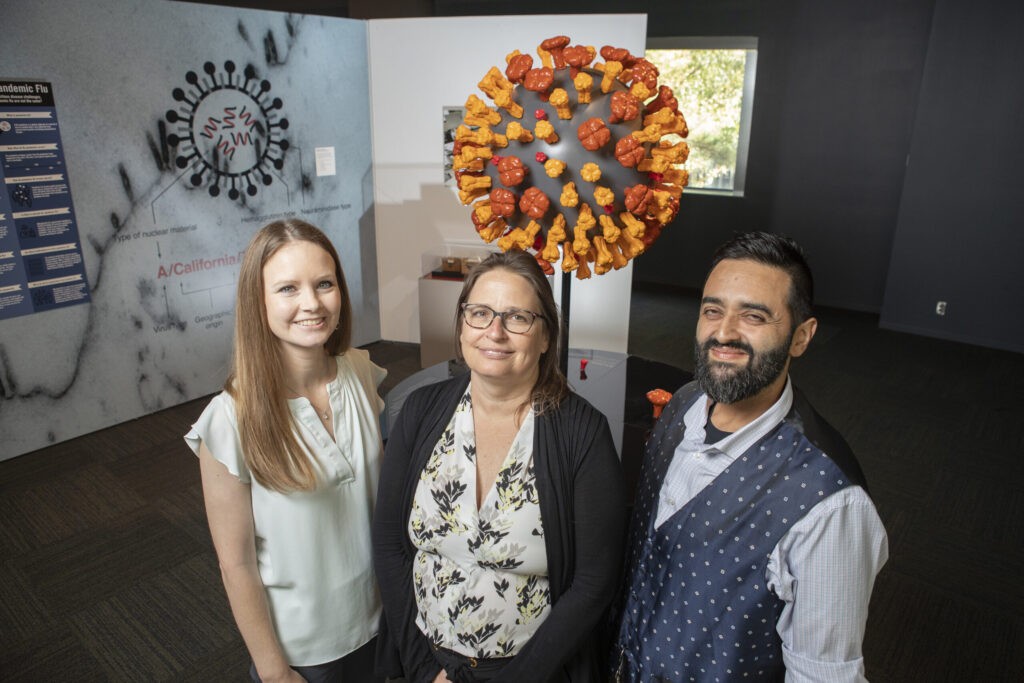Odum School of Ecology faculty Pej Rohani and John Drake are part of a University of Georgia team working to strengthen public health response to infectious disease threats and support workforce development.
UGA and the Georgia Tech Research Institute (GTRI), in partnership with the Georgia Department of Public Health, have received a five-year, $17 million cooperative agreement from the Centers for Disease Control and Prevention to establish a Pathogen Genomics Center of Excellence.
The award is part of a $90 million investment by the CDC to build a network of centers in five states. Each Pathogen Genomics Center of Excellence (PGCoE) consists of a health department and one or more academic institutions. UGA will lead the effort to translate new discoveries into usable data and interventions.
As part of the UGA team, Rohani and Drake bring expertise in computational modeling and population biology. Rohani, Regents’ Professor, associate dean for academic affairs and UGA Athletic Association Professor in Ecology and Infectious Diseases, uses a combination of mathematical modelling, data analysis and statistical inference to understand the ecology and evolution of infectious diseases of human and wildlife, including childhood infections and emerging infectious diseases.
“I am excited to collaborate with my colleagues through the PGCoE on a number of well-aligned problems of mutual interest, starting with computational methods to predict the evolutionary trajectory of seasonal influenza viruses,” Rohani said.
Drake, Regents’ Professor, is director of the Center for the Ecology of Infectious Diseases. His research seeks to understand the dynamics of biological populations and epidemics, focusing on how to use mathematics and statistical tools to better understand and respond to epidemics.
“I’m delighted to see this effort,” said Drake. “I firmly believe that better integration of genomic technology and information with epidemiological models is the future of infectious disease intelligence.”
The Georgia Department of Public Health will provide overall leadership and prioritization of center efforts. GTRI will lead the operations and implementation arm of the Georgia-based center. Collectively, this work will be focused on transitioning innovations out of academia and into use at public health departments across the United States.
“We really are trying to learn about outbreak epidemiology, those population-scale processes that are impacting disease spread. Patterns of transmission that are really hard to observe,” said Justin Bahl, an associate professor with joint appointments in UGA’s College of Public Health and College of Veterinary Medicine.

The project builds on five contracts and grants involving Rohani, Drake and Bahl, who leads the project at UGA. That foundational work history—including research through the Center for Influenza Disease and Emergence Research and the Center for Influenza Vaccine Research in High-Risk Populations—has allowed them to go after larger grants and be competitive, according to Bahl.
“We’ve been able to support each other’s larger vision, and we’re developing those visions complementary to each other, rather than in conflict,” he said. “This larger ecosystem, this complementary environment that we’ve built, allows us to write these big projects together.”
PGCoE researchers will use genomic data to learn how pathogens like the SARS-CoV-2 virus move and infect people within populations. This work is what allows scientists to trace the origins of a virus strain and track its spread as it moves from place to place.
Bahl said that adding pathogen genomic data to traditional epidemiological surveillance could dramatically strengthen the public health workforce’s ability to prevent and mitigate local outbreaks.
“We’re going to be able to work closely with these departments of public health, connect the genetic data from the pathogens to the actual population characteristics. That provides information for those public health practitioners to direct their interventions,” he said.
This work will build on the innovative tools generated from UGA’s interdisciplinary infectious disease research centers, including the Center for Vaccines and Immunology, Center for Influenza Disease Emergence Research and the Center for Ecology of Infectious Diseases.
“We have a very strong infectious disease research community here at UGA, especially with pathogen transmission modeling, and a lot of experience with integrating different types of data,” said Bahl. “There are probably not many other places that have the amount of expertise that’s here.”
This project, which will establish the Center for Applied Pathogen Epidemiology and Outbreak Response, is the fourth major funding investment the university has received in the past five years.
Bahl is optimistic that this investment in pathogen genomics will create more pathways for data sharing among scientists and practitioners and enhance genomic surveillance nationwide.
“We’re active, and we’re trying to learn more, translate more to the public health labs and be better prepared collectively to respond to these new threats,” said Bahl. “This investment is about trying to strengthen partnerships with public health. We’re part of that effort, building up public health across the board.”
In addition to Bahl, Rohani and Drake, the team includes Tonia Parrott at the Georgia Department of Public Health and Amy Winter, Erin Lipp, Travis Glenn, Magdy Alabady, Liang Liu, Susan Sanchez and Mandev Gill from UGA. They will be joined by Rebecca Hutchins and True Merrill at GTRI. The network across Georgia also includes researchers from Emory University, Georgia State University and Augusta University Medical College of Georgia.

